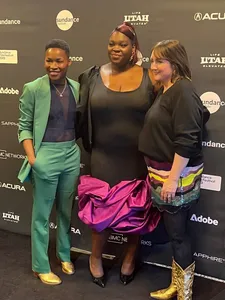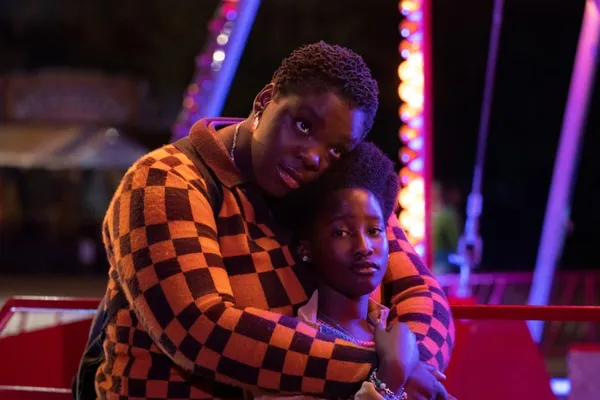Glasgow Film Festival will open on March 2 with Adura Onashile’s debut feature Girl, which charts a turning point in the relationship between a refugee mother (Déborah Lukumuena) and daughter (Le’Shantey Bonsu) who have built a new, self-contained life for themselves in Glasgow. We caught up with Onashile ahead of the film’s premiere in Sundance. In the first part of our chat, we talked about the genesis of the film and working with her cast. In the second section, Onashile talked about the look of the film, including the influence of video artist Kahlil Joseph - known for directing Beyonce’s videos including Love Drought and Sorry - and Moonlight director Barry Jenkins, and her plans for the future.
The lighting in Girl is very striking and beautiful. I think that a lot of the reason for that is because for much of the time you've used a quite shallow focus, so you work quite a lot with light and reflections. Can you tell me a bit about that?
The people I’m influenced by are Kahlil Joseph, Barry Jenkins, Bradford Young, who shot Arrival. Especially Khalil Joseph, who hasn't really done much film. But I love the way his subjects are lit and I think it's because it's almost painterly. There's a sort of emotional depth that comes from all the colour that I really love. And when you're dealing with Black characters and stories, it's not something that we're afforded a lot, especially in working class stories. We go for grit as opposed to beauty but that was really important to me. The characters’ world, when it works, is a palace, its imagination, its freedom, until it stops being and I really wanted that to come across. The way to do that was with colour - to express that when they're in their flat everything is possible.
There’s real attention to detail in general in your film, the colour of the costumes and their detailing, particularly the way that they have a lived-in look. How much were you involved in that process?
It all came from the story. I know that when people are new to Glasgow, they are given vouchers and they can only spend the vouchers in charity shops. So that's a detail that I knew - that all their clothes had to be second-hand or third-hand. And that's something I communicated with costume designer Kirsty Halliday. What that also does is give more texture because they're more lived in. What I did have to be careful about with all the colour was that it didn't start feeling not of this world, we had to keep it grounded all the time. And Kirsty was amazing at that and Soraya Gilanni Viljoen, the production designer was amazing at that as well. Everybody worked really well together because in the script there was all this silence.It was really important to figure out how we were going to capture that elevated sense of reality, that poetry, that depth.
The score is very unusual, because it's got a lot of choral work which is not terribly common in films, especially not films that are, as you say, depicting a working class milleu. You’d worked with Ré Olunuga before on Expensive Shit, can you tell me a bit about the collaboration?
 |
| From left to right: Adura Onashile, Déborah Lukumuena and Girl producer Ciara Barry at Sundance Photo: Susan Norget |
Ré and I come from the same background, we're both Nigerian, we have quite similar politics and we are always interested in subverting some things about how urban Black characters are portrayed in the film, and how music and often urban music accompanies urban characters. I remember him saying to me once, this is before we landed on voices, he was like, ‘What is it about working class characters that we don't deserve the orchestral treatment? Why don't we deserve classical music? Why don't we deserve the 50 piece orchestra?’ I loved that. And it's true.
Then the thing about the women's voices was… the state of violence against women and traumatic experiences against women feels very universal to me, and it feels it's much more present than it should be. My short film was around that and it's something that I'll always want to explore to a certain degree - how girls become women and the process of that and how that can be interrupted, or enhanced, I think I'll always be interested in that. So the women's voices, for me, acted a bit like a Greek chorus. They were witnessing, they were sometimes trying to change what was happening, they were holding, they gave a lot of hope. For me, that's the way things are going to change, like the collectivism of how we approach these issues and violence against women and the trauma that women go through. And there's something deeply ageless and timeless about that. But for the longest time, we had been unequal. And I felt like there was a universality to that, that maybe I could capture that through black women's voices.
I know you've said some of Girl was loosely based on some of your experiences, I assume, from living in high rises.
I was a big spy into other people's houses. A big spy.
Are you already working on other projects?
There's another feature I want to start writing but there's no funding for it yet. It's nerve-wracking. I also want to work on other people's projects. I can't afford to work the way I did on this indie, because I just can't afford it. So I need to find other ways of working. I guess, people need to see the film and have faith in me.
What do you think you'll take forward from this film to your next film, maybe a technique or something you’ll do differently?
There's a lot I can say to you about this and I'm a bit reticent about going into it. But it was a very, very tough process and on many different levels. I think that I didn't put enough in place to understand how I might need to protect myself within the process. That's just the reality of making a film as a Black woman currently. I think one of the biggest things is that once you get the green light and you get a budget, sit with an assistant director and go, “What is the correlation between my script and this budget?” They'll say to you, “You're gonna have to get rid of like 20% of your script”. Just practical stuff. And then I will have the time over a week to go back into my script and go, “What am I going to lose? What am I going to keep in this story?” It is mad to me that there isn't that process between being green-lit, going into prep and then shooting the film. It’s all happening at a rush. So who are the initial people you talk to, to get on your film? The cinematographer is the most important but actually, I think, a good first assistant director, who understands, that is just as important in those first stages. They would be the first person I speak to.
The opening gala screening of Girl is soldout at Glasgow Film Festival but tickets are still available for an added screening on Thursday, March 2 at 3.15pm in Glasgow Film Theatre. Studio Soho will distribute the film in the UK later this year






















